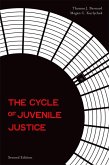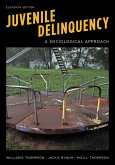This revised edition features updated research, new developments in technology, and recent policy on juvenile delinquency and youth violence. The authors underscore the enormous payoff in targeting potential serious, violent, and chronic juvenile offenders at the earliest opportunity and provide a framework for evidence-informed state juvenile justice systems: the Comprehensive Strategy for Serious, Violent, and Chronic Juvenile Offenders. This strategy recognizes, first, that a relatively small proportion of those who enter the juvenile justice system will prove to be serious, violent, or chronic offenders, but that group accounts for a large proportion of overall delinquency. Second, this strategy builds on the fact that serious, violent, or chronic delinquency emerges along developmental pathways, allowing earlier identification of juveniles most at risk for later serious offending. A third component of this approach is effective intervention capable of reducing the recidivism of those juveniles most at risk for further delinquency. This framework emphasizes an evidence-based approach to reducing the recidivism of those juveniles most likely to reoffend from intake onward to probation, community programs, confinement, and reentry.
Bitte wählen Sie Ihr Anliegen aus.
Rechnungen
Retourenschein anfordern
Bestellstatus
Storno









